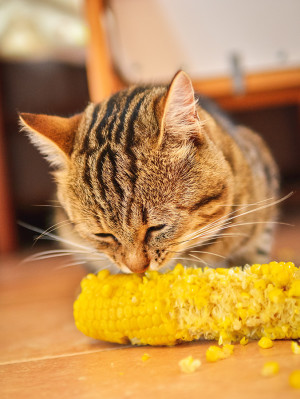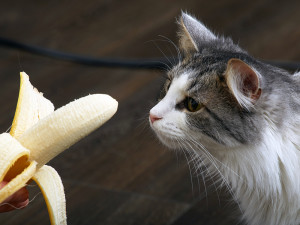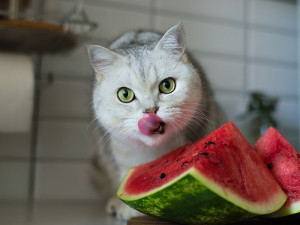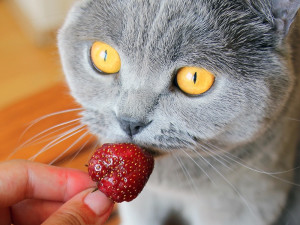Can Cats Eat Shrimp?
They definitely want to...
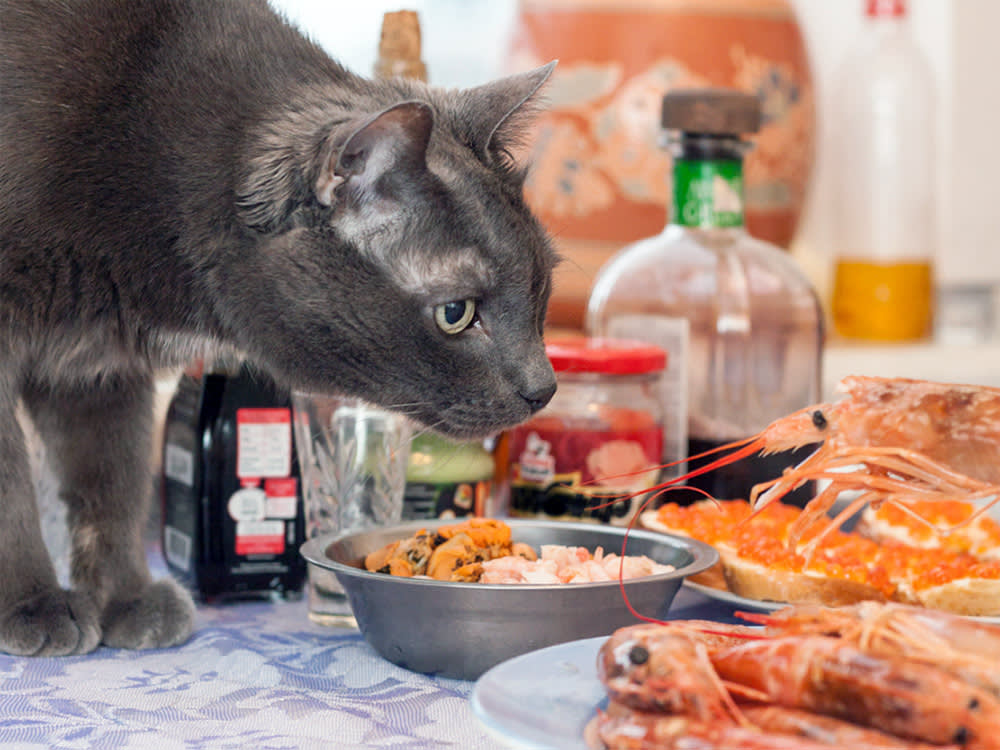
share article

Your pet wants you to read our newsletter. (Then give them a treat.)
Fried shrimp, boiled shrimp, barbecued shrimp, shrimp cocktail, or popcorn shrimp; the possibilities are endless. And without sounding too much like Bubba from Forrest Gump, if you know, you know. Shrimp can be delicious and nutritious for us, so you may be wondering if it is OK to share shrimp with your cat.
The short answer is yes, shrimp are safe for cats and can provide them with some important nutrients. Just follow some basic guidelines, and you can safely share your favorite shrimp with your favorite feline.
Nutrition facts about shrimp for cats
There are more than 2,000 different species of shrimp out there in the world, found in both saltwater and freshwater. Shrimp are considered invertebrate animals in the crustacean family and are closely related to other edible crustaceans like lobsters and crayfish. As invertebrates, shrimp do not have any bones but instead have an outer protective shell made of a tough material called chitin.
Typically when we eat shrimp, we remove the outer shell and just consume the cooked meat inside. This meat is high in protein and low in fat and also contains many vitamins and minerals.
Are shrimp good for cats?
Shrimp are good for cats in moderation. They can provide some important nutrients and many cats love the taste. However, shrimp are not part of a balanced diet for cats. Because cats are obligate carnivores, they have very specific nutritional needs. Treats and snacksopens in a new tab like the occasional bite of shrimp should be kept to a minimum to ensure the bulk of their diet is balanced. As a treat, shrimp can provide some great nutrients including:
Protein: Shrimp are high in protein, a nutrient that is critical for cats. As obligate carnivores, cats have a high-protein requirement in their diet. Commercial cat foods must provide a minimum amount of protein to meet this need and most provide way more than that. Providing high-protein snacks like the occasional shrimp can give your cat a delicious and healthy nutritional boost.
Low fat: Cats actually handle dietary fat quite well and most of the time do not need to really limit their fat intake. However, when you are offering treats or table scraps in addition to their primary diet, you do want to keep added calories to a minimum to avoid weight gain. Choosing snacks lower in fat can be a good strategy, especially if you have a cat who is already overweight opens in a new tabor tends to be more sedentary.
Omega-3 fatty acids:opens in a new tab Shrimp and other seafood are a great source for fatty acids like EPA and DHA. These are critical to healthy brain and eye development in growing kittens and can also provide anti-inflammatory benefits to adults.
Can cats eat shrimp tails?
Cats should not eat shrimp tails or any parts of the shrimp shell. This is because the shell is composed of a material called chitin that is difficult to digest, especially in large pieces. It can pose a choking hazard if your cat attempts to swallow a large piece of the tail or shell. It can also cause digestive upsetopens in a new tab like vomiting or diarrheaopens in a new tab and put them at risk for intestinal blockagesopens in a new tab if a large piece of undigested shell gets stuck in the intestines.
Are shrimp completely safe for cats?
Plain, cooked shrimp are generally safe for cats in moderation. It is important to always cook shrimp, other seafood, and meats properly and to a high enough temperature to kill potential pathogens that can make them sick. There are few other factors to consider before offering shrimp to your cat:
High in iodine: Shrimp and other shellfish absorb iodine from seawater. In small amounts, this is usually not a problem and can be a good source of iodine in a balanced diet. However, cats with certain conditions, such as hyperthyroidismopens in a new tab may need to limit their iodine intake. Consult with your vet if your cat has hyperthyroidism or other chronic health conditions before feeding them shrimp.
Choking hazards: Be sure to remove shells and tails from shrimp before sharing with your cat to avoid choking hazards. Also, it’s a good idea to cut up larger shrimp into bite-sized pieces for them so they don’t try to scarf down a piece that’s too big for them to safely chew up.
Other ingredients: This is an important reminder to consider all the ingredientsopens in a new tab in a dish you intend to share with your cat. While shrimp are fine for cats, if they are cooked with unhealthy ingredients like garliopens in a new tabc, onions, lots of salt, spicy chilis, lots of sugar, or high-fat ingredients, they are not safe to share. Try to prepare a plain piece of shrimp for your cat, such as a boiled or steamed version without any other ingredients.
Mercury content: Mercury contamination is a concern with any seafood as mercury accumulates in these animals from pollutants in the water. Larger animals, like predators that eat smaller animals, tend to accumulate more mercury in their tissues, but shellfish like shrimp also contain small amounts of mercury. If your cat just gets a small piece of shrimp once in a while, there is only minimal risk.
Allergies: Cats can have food allergies opens in a new tabto fish and shellfish. If your cat has an existing food allergy to fish and/or shellfish, avoid sharing shrimp. If you are introducing shrimp for the first time, start with a small bite and monitor your cat for any adverse reactions.
The bottom line: Can cats eat human food?
Cats can eat many human foods, but it is important to remember that cats have unique nutritional needs that are different from ours. As obligate carnivores, they need to eat a diet that is complete and balanced for cats to ensure they don’t develop nutritional deficiencies. Also, they do not process carbohydrates, especially sugar, as efficiently as we do, so it is best to avoid snacks or treats that are heavy on the carbs or contain lots of sugar.
Finally, there are quite a few foods that are perfectly safe for us but can be toxic to catsopens in a new tab, so if you are unsure about a particular food, be sure to do your research before offering it to your cat. As a general rule, treats and table scraps should be less than 10 percent of your cat’s total calories, and the rest should come from a complete and balanced cat food diet.
This ensures your cat doesn’t fill up on foods that lack the nutrients they need most and also helps to limit excess calories that could lead to weight gain and related health problems like diabetes opens in a new taband arthritisopens in a new tab. As long as you keep these guidelines in mind, you can share the occasional treat and table foods with them, which can be a fun and enriching bonding activity.
Other foods that are safe for cats:
Blueberries can be a safe snackopens in a new tab for cats in moderation.
Peanut butter can be a good choice, opens in a new tabtoo —with a few caveats.
Carrots are also safe opens in a new tabin small amounts.
Other foods that are dangerous for cats:
Chocolate is toxicopens in a new tab to cats and should never be shared.
Garlic is also toxic and can cause a life-threatening anemia in severe cases of toxicity
Cinnamon should also be avoidedopens in a new tab.
FAQs (People also ask):
How much shrimp can a cat eat?
Plain cooked shrimp can be an occasional treat for a cat and should not be more than 10 percent of your cat’s total calories.
Is it OK to give cats shrimp?
Yes, plain cooked shrimp is a safe and healthy snack for cats. Beware of other ingredients that may be toxic if the shrimp is cooked with other foods.
Why do cats like shrimp?
Cats like foods that are high in protein, like shrimp. They may also like the strong seafood smell.
Can cats eat shrimp?
Yes, cats can eat plain, cooked shrimp in moderation. Make sure to remove the shells and tails and to avoid other ingredients that may be toxic.
Can cats eat shrimp with shells on?
No, the shells are not easily digested and can be a risk for choking or intestinal blockages.
Are shrimp safe for cats?
Plain, cooked shrimp are a safe snack for most cats. If your cat has health problems, consult your vet first.
References:
American Journal of Clinical Nutrition: Effects of Shrimp Consumption on Plasma Lipoproteinsopens in a new tab
Environmental Health Perspectives: Decadal Changes in the Edible Supply of Seafood and Methylmercury Exposure in the United Statesopens in a new tabFood Science Nutrition: Mercury Concentrations in Store-bought Shrimpopens in a new tab

Dr. Amy Fox, DVM
Amy Fox, DVM is a small animal veterinarian in New York City. A lifelong animal lover, Dr. Fox studied biology in college and then worked as a veterinary nurse before pursuing veterinary school at Cornell University. She has worked in many different settings including shelter medicine, emergency medicine, general practice, and animal cruelty and forensics. She is especially interested in nutrition, preventative medicine and care for senior pets. Dr. Fox also enjoys writing about veterinary medicine and teaching. In her free time she loves to cook, garden, and go for long runs.
Related articles
![Cat eating from a plate of raspberries and blueberries]() opens in a new tab
opens in a new tabCan Cats Snack on Blueberries?
Go ahead and serve up the superfood — with a couple caveats.
![White kitten with tongue out next to slices of watermelon]() opens in a new tab
opens in a new tabCan My Cat Safely Enjoy Watermelon? A Guide to Feline Dietary Choices
Yes, the summertime staple is on the list of “safe” foods for cats.
![Grey cat eats a strawberry]() opens in a new tab
opens in a new tabCan Cats Eat Strawberries?
Soon, they’ll be demanding you make this strawberry ice cream recipe on repeat.
![a cat stares at green grapes on a plate]() opens in a new tab
opens in a new tabCan Cats Eat Grapes?
This is one you’ll want to bookmark.
- opens in a new tab
Can Cats Eat Popcorn?
They want to enjoy movie night, too, you know.
![A woman eating peanut butter toast with her cat laying on the table]() opens in a new tab
opens in a new tabCan Cats Eat Peanut Butter?
The sweet and salty treat is okay in moderation.

